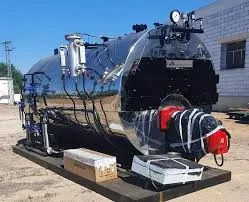
Dec . 05, 2024 15:13 Back to list
Different Types of Hot Water Boilers and Their Applications
Understanding Different Types of Hot Water Boilers
Hot water boilers, essential components in heating systems, are designed to efficiently provide hot water for heating or domestic use. Depending on their design and operational principles, these boilers can be categorized into various types. Understanding these types can help homeowners and businesses choose the most effective system for their needs. This article will explore the most common types of hot water boilers, including fire-tube, water-tube, and electric boilers, as well as their features, advantages, and applications.
Fire-Tube Boilers
Fire-tube boilers, one of the most commonly used types, operate by having hot gases produced from combustion pass through tubes that are surrounded by water. The primary design allows for efficient heat transfer, as the flames and hot gases heat the water in the surrounding shell.
One of the advantages of fire-tube boilers is their relatively simple design, which can lead to easier construction and maintenance. They are typically more compact compared to other models and can quickly respond to changes in hot water demand. Fire-tube boilers are often used in smaller commercial applications and residential setups due to their affordability and efficiency.
Water-Tube Boilers
In contrast to fire-tube boilers, water-tube boilers have water flowing through the tubes, which are heated by hot gases on the outside. This design allows for a larger heating surface area and better heat transfer efficiency. Water-tube boilers can operate at higher pressures and temperatures than fire-tube models, making them suitable for industrial applications where high-capacity and steam generation are necessary.
The main advantage of water-tube boilers is their capability to produce steam and hot water at higher pressures. They are less prone to explosions, as the volume of water in the system is small, which minimizes risks. However, they tend to be more complex in terms of construction and require more maintenance. As a result, they are typically used in large-scale industrial settings or power plants.
hot water boiler types

Electric Boilers
Electric boilers are another type that operates using electricity to heat water. Inside these boilers, electric heating elements are submerged in water, generating heat through resistance. Electric boilers can be highly efficient, as they convert nearly all the electrical energy into heat.
The advantages of electric boilers include their smaller size, minimal emissions, and reduced maintenance compared to fuel-fired boilers. They can be ideal for residential applications where natural gas supply is limited or where environmental regulations are strict. However, the main drawback is the dependency on electricity, which can lead to higher operational costs in areas where electricity prices are high.
Combination Boilers
Combination boilers, or combi boilers, serve as both space heaters and water heaters, making them a popular choice for residential applications. They heat water directly from the mains when a tap is turned on, eliminating the need for a separate hot water tank. This on-demand heating makes them highly efficient and saves space.
One significant advantage of combi boilers is their energy efficiency, as they only heat water when needed. However, they may struggle to provide enough hot water for simultaneous demands in larger households. Therefore, while they are suitable for smaller homes or apartments, larger families may require a different system.
Conclusion
Selecting the right hot water boiler type depends on various factors, including energy efficiency, space requirements, and heating demands. Fire-tube and water-tube boilers cater to different industrial needs, while electric and combination boilers are more suited for residential use. Each type has its advantages and disadvantages, and understanding these can help in making an informed decision. The right boiler not only ensures comfort and convenience but can also lead to significant energy savings over time. When considering a hot water boiler, it is essential to evaluate both current and future needs, ensuring an optimal choice that meets both efficiency and performance standards.
-
High-Efficiency Commercial Oil Fired Steam Boiler for Industry
NewsJul.30,2025
-
High-Efficiency Biomass Fired Thermal Oil Boiler Solutions
NewsJul.30,2025
-
High Efficiency Gas Fired Thermal Oil Boiler for Industrial Heating
NewsJul.29,2025
-
High-Efficiency Gas Fired Hot Water Boiler for Sale – Reliable & Affordable
NewsJul.29,2025
-
High Efficiency Biomass Fired Hot Water Boiler for Industrial and Commercial Use
NewsJul.29,2025
-
High-Efficiency Biomass Fired Hot Water Boiler for Industrial Use
NewsJul.28,2025
Related PRODUCTS






















